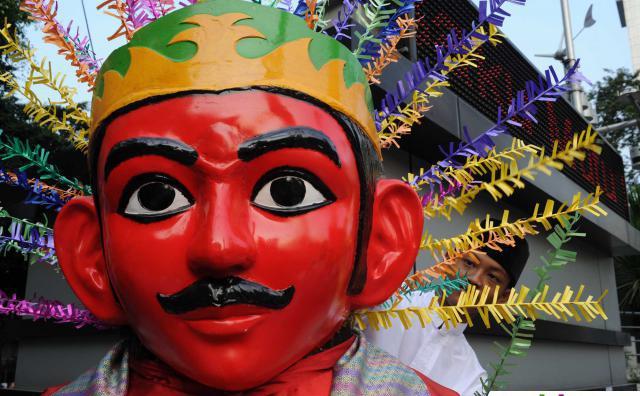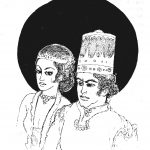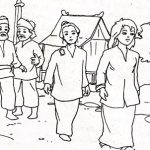
This time, The Jombang Taste greets you through an article of Betawi folklore, namely the character Si Jampang. The life story of Si Jampang is as well-known as the life of the Betawi hero Si Pitung. What is the origin of Si Jampang’s life? The legendary story of Si Jampang begins with a husband and wife who feel happiness after seeing their baby born safely.
“Hm, this is my first son. Look at him looking healthy and handsome!”
“Yes Bang! Our child looks very handsome, huh?”
“Who used to be the father? Banten people are very handsome!” continued the husband.
“My brother always relies on your origin only. Without me, his mother, who is from Jampang, would never be there!”
“Yes! Then what name is he named?” asked the husband. After going through a tough debate, an agreement was finally reached, the one week old baby was named Jampang.
Betawi folklore states that the little boy grew up to be a really handsome, handsome young man of Banten descent, he was also taught the very famous martial arts knowledge, he was also good at playing the golok. If he is present at parties the crowd always attracts the attention of teenage girls.
When he was old enough he married a beautiful girl from Kebayoran Lama. After marriage, Jampang did not want to live in the same house with her parents. She also didn’t want to stay at her father-in-law’s house. He prefers to live independently. Joy and sorrow will live with his beloved wife.
Thus, having accumulated sufficient supplies he bought land and built his own modest house. He and his family moved to Grogol, Depok. He lives peacefully and happily with his wife. But unfortunately after being blessed with a son, not to mention that the child was a teenager, his wife had died.
Since then Jampang has only lived with her only son. This child is known as Jampang Muda. He also grew up to be a handsome young boy like his father. The Betawi folklore still continues with the household life of Si Jampang, who experienced difficulties after his wife passed away.
Si Jampang wants his child to become a pious person who is useful to society. So he left the child at the Islamic boarding school. Sometimes the child comes home to see his father because he prefers to live in the pesantren with his friends.
Since his wife Jampang died, he felt lonely. He was even more saddened by the fact that the lives of many Betawi people were suffering. Only a small number of them are rich and happy. Like the Pitung, Jampang then robbed the wealthy people who were stingy and then gave it to the suffering population. This is the other side of the Betawi folklore.
One day his son came home. “Father, I don’t want to go to the pesantren anymore. I’m so embarrassed, Dad!” said his son.
“Shame? Shame, why Tong?” asked the Jampang curious. Tong is the father’s call to his son.
“My father is from Banten. Usually Banten people are pious and live well. But how come you often rob you? At the pesantren. People have been talking about it all the time. I’m so embarrassed, Dad.”
“You don’t need to give advice to Father. You were still a child yesterday, Tong … what do you actually mean to come home?” asked his father.
“I don’t want to recite the Koran anymore, Dad.” replied the son.
“Poor, you Tong. Earlier you gave advice like a kiai, now you don’t want to recite the Koran anymore. What do you want to be? Want to be a hitman like your father?”
The young Jampang shook her head. “So what do you want, Tong? You don’t want to go to bed? Then, it’s better to just get married.”
His son was shocked to hear Jampang’s words.
“I don’t want to get married, well, I’d better just go into lodgings. If you want to marry again I don’t forbid.”
“Ha hah ha,” It’s easy to laugh out loud, if you want another mother, I’ll find you!”
In the Betawi folklore it is stated that Jampang has a friend in Tambun, named Sarba. That day he visited his friend’s house. When the door to Pak Sarba’s house was opened it turned out that it was Ciput, Pak Sarba’s assistant.
“Mr. Sarba is there?” asked Jampang.
Ciput replied sadly, that Pak Sarba had passed away.
“Poor, yes,” said Jampang regretfully. “So Mayangsari is a widow; Put?” Ciput nodded his head.
“Poor,” said Jampang once again.
Jampang remembers Sarba, his friend is a good person. He had known her since childhood, both from Banten. Then married and had a child named Abdih.
Not long after that Mayangsari came out of his room. Seeing her husband’s best friend came she was sad. He repeated the story about Sarba who had passed away a long time ago.
“At that time Bang Sarba was sick or Mayang, how come I was not told?”
“It’s a very long story, Jampang. When your brother didn’t have children, we both went to Kepuh Batu Mountain. Pilgrimage to the grave while bruising. The locksmith named Pak Samat, accepted the arrival of both of us. Pak Samat recited prayers and mantras while burning incense until the jinn came out of the tomb. ”
“Mayang is scary too. I can’t stand being alone in the tomb so scary.”
“Jampang kept mocking me. I continued the story. Your brother asked the genie. Can I have a child? The genie is grumbling. Bang Sarba is very happy to hear that he will have a son. Then he promised that if the baby is born, he will bring a pair buffalo to the tomb of Mount Kepuh Batu! ”
“What’s next, Mayang?”
“Your brother and I went home. A few months later I got pregnant, then a boy was born, that was Abdih. When he was fifteen years old he wanted to go to school. But your brother was confused because it was difficult to live. Then your brother took me and Abdih to Betawi. Your brother wanted calmed my heart and her son. Here your brother got sick and died. According to the shaman because he forgot his promise first. ”
Jampang hesitated.
“People will die if there is any way, Mayang. Like my brother. Invited to go to Betawi, suddenly left. He is a good person, Mayang.”
Betawi folklore is still going on. Jampang is sad. Then he asked where the Abdih was.
“I was in school in Bandung,” said Mayangsari. “Mayang does not need to be confused thinking about Abdih,” said Jampang.
“Which may not be confusing, Jampang. The school in Bandung needs a big cost. Finding the money is difficult.”
“Let the school children in Bandung let it go, do not think about it,” said Jampang again, “Anyway, I will take care of him later.”
“This is Mayang,” said Jampang, “Mayang has become a widow and I am a widower, we better get married. Is it good?”
Mayangsari was shocked, then very angry, he felt insulted.
“Don’t talk carelessly, Jampang!” said Mayangsari. “I’m your ex-wife’s ex-wife. Do you want to marry me? If you want to get married, get married, you want to find a widow, virgin, or shemale, that’s your business, but not with me.
Jampang is very shy. He hurried out of the house. In the front yard he saw Mayangsari closing the door tightly, a sign that Jampang will no longer be accepted at his house. The story of the legend of Si Jampang, the champion from Betawi, does not stop here.
On the way, Jampang met Ciput. “I’m so embarrassed, Put!” Jampang recounted his experience with Mayangsari.
“Even though I really like Mayang. She is still beautiful. My friend’s ex-wife. What’s wrong? That’s a sign of respect for a friend who is deceased, but he even feels humiliated. It’s weird”
The female maid who never left Mayangsari was persuaded by Jampang to help the Jampang.
“The tree will be fine, Ciput,” promised Jampang. Suddenly the door of the house opened. Mayangsari looks even angrier.
“Ciput, come in!” he shouted. His assistant obeyed. He entered the house. Directly to the back room. Then Mayangsari shouted while glaring towards Jampang. “Go, Jampang! Get out of here!”
But Jampang still stood in his place. Mayangsari is getting angrier towards Jampang. “I do not want to be your wife!”
Before he could say anything, Mayangsari had left Jampang. He closed the doors and windows of the house. I don’t care about the stunned Jampang.
“Damn once I did today, but I will not give up just like that.” Said Jampang while walking lazily.
Jampang headed to Sarpin’s house, his nephew happened to be at home. “I need a shaman, Pin,” he told Sarpin. Sarpin wondered. “For what, Mang Jampang?” Jampang then recounted his experience with Mayangsari. “Hehehe Mang Jampang really love Mayangsari?”
“Pin! Don’t talk too much,” said Jampang, “Find the shaman!” “The shaman thing is easy, Mang. I know the shaman is effective. His name is Pak Dul from Gabus village. He is very smart. Anyway, the person used will definitely be affected. Want to go to his house, Mang?”
“The faster the better,” Jampang replied.
The story of Si Jampang’s life continues. That night they also left. They walked carrying two torches. One in Jampang’s hand and one in Sarpin’s hand. Their clothes are black. The knife is tucked in the waist. On the neck is a sarong necklace as a night air cooler.
They walked past the rice fields and through the gardens of the people, as well as through the quiet graves. Their torches kept burning. Often the torch is pushed down, so that the oil goes down to the fire so that the flame is greater.
Finally, they arrived at the house of Pak Dul, the famous Gabus village shaman. “I asked for Mbah Dukun’s help, so that Mayangsari would go crazy with me,” Jampang said frankly without embarrassment.
Jampang also handed the paste greetings to Pak Dul. Gladly the shaman put the contents of the greeting into his shirt pocket, he recited incantations or spells. His mouth looked numb. Soon Jampang was given a spell. Jampang was also informed how to use it. Then Jampang and Sarpin hurried home.
Jampang’s mind is always on Mayangsari. He walked very fast. No matter the other leg got stuck in the mud. The image of Mayangsari’s face teased him, bringing him to dreamland. His nephew was bothered because the road was far behind.
Jampang had put these uses in Mayangsari’s house. Once hit by witchcraft Mayangsari went crazy. He immediately laughed. Dressed however you want, there is no shame at all, especially to every man who passes in front of his house. When Abdih returned from Bandung, Mayangsari immediately kissed and hugged him.
“Handsome handsome!” Mayangsari seduced him. His son was shocked and sad to see the change in his mother. “Let’s Jampang! Let’s hug it tighter.”
His son immediately awakened his mother.
“Mother! Mother! Wake up, Mom!” Ciput his loyal servant came closer. “Why did you get this way, Ciput?”
“Maybe because of Jampang,” said Ciput, “he had been here and asked to marry your mother but was rejected. He said it was better to be crazy than to marry Jampang.”
“So, you just like this?” Asked Abdih.
Ciput nodded.
“It seems like my mother has been hit by witchcraft,” said Abdih. “The culprit is certainly Mang Jampang. It’s really embarrassing. I’m so embarrassed. Which shaman can cure Mother, Ciput?”
Ciput has never known about witchcraft. So he couldn’t answer. Abdih asked here and there. Abdih wants his mother to return to a normal life without the influence of the pellet science sent by Si Jampang.
Finally, Ciput got the news. Pak Dul in the village of Gabus is a smart person who is believed to be able to get rid of the influence of witchcraft. Because the shaman himself makes the magic, with no difficulty he also withdraws the magic. Mayangsari recovered instantly. Don’t remember the Jampang anymore. After that Abdih looked for Jampang. He was furious.
“Whether you can or not, I have to marry your mother, Abdih,” said Jampang emphasized.
“I do not forbid it, Mang Jampang” said Abdih who was also frightened, “But there is a condition, Mang Jampang must hand over a pair of buffalo as his wedding gold.”
“I don’t mind, Abdih. I’ll try!”
Abdih returned home to convey Jampang’s commitment to his mother.
Where do you get a pair of buffalo? The price of a pair of buffalo is very expensive. Jampang has no money. However, he immediately remembered Haji Saud in Tambun. He’s so rich. The rice fields, vast. Two-tailed buffalo is nothing. To that place, Jampang and Sarpin went robbing easily.
When he and Sarpin were about to leave the village door, the police had already surrounded them. They pointed rifle barrels at Jampang and Sarpin. Get caught Jampang. Jampang cannot fight back.
The wealthy people, landlords, and Dutch government officials were delighted to see that Jampang had been imprisoned and finally sentenced to death. On the other hand, the little people, the peasants and those who suffer are very sad.
Although Jampang often robbed, he never enjoyed the results of the robbery by himself. For the Little People, Jampang is a hero. They often got their share of the plunder from the rich ‘and the greedy and miserly landlords.
Jampang met an unfortunate fate when he robbed a pair of buffaloes to be used as a dowry for Mayangsari, which means for his own interests. Indeed, the method is not right, not lawful, no one should copy it so as not to have bad luck. That was the end of Si Jampang’s life, who ended up in prison for theft.
The mandate of this Betawi folklore is that good cannot be combined with evil. If you have a good intention to help others, then do that help in good ways too. In addition, the moral message of the Betawi folklore about Si Jampang is that we always respect the wishes of others and do not impose our own will. Hopefully this article The Jombang Taste can add to your insight. See you in the next Indonesian folklore article.
References:
Ara, LK. 2008. Folk Story from Aceh. Jakarta: Grasindo.
Danandjaja, James. Folklore from Bali. Jakarta: Grasindo.
Hidayat, Kidh 2008. Folk tales throughout the archipelago. Jakarta: Indonesian literature.
Abdulwahid, et al. 2008. Codification of Folklore in Pangandaran Tourism Area, West Java. Bandung: Center for Language Development and Development of the Ministry of Education and Culture.
Lubis, Panguhan Z. 1996. Folklore from Simalungun (North Sumatra). Jakarta: Grasindo.
Navis, A.A. 2001. Folklore from West Sumatra. Jakarta: Grasindo.
Rahimsyah. 2001. Collection of Folklore and National History. Surabaya: It was bright.
Reza, Marina Asril. 2008. Best Story Original Archipelago. Jakarta: Visimedia.
Optima Pictures team. 2010. Archipelago Stories Collection of Fairy Tales, Epic, Fables, Legends, Myths and History. Jakarta: TransMedia.
Soemanto, Bakdi. 2003. Folklore from Yogyakarta. Jakarta: Grasindo.
Sumardiyanto, Anwar and Eka Katminingsih. 2011. Folk Story. Sidoarjo: World of Science.



Tinggalkan Balasan